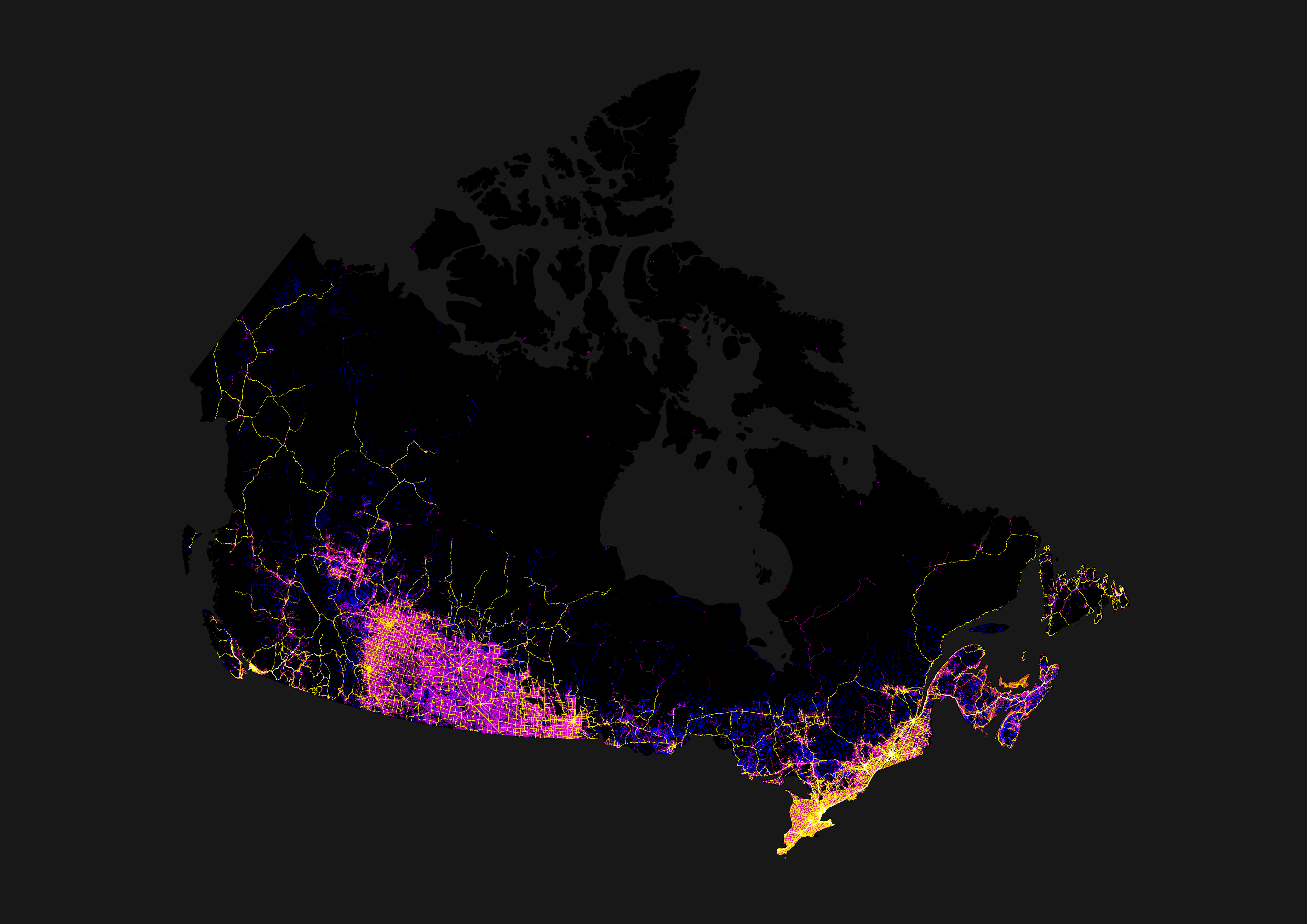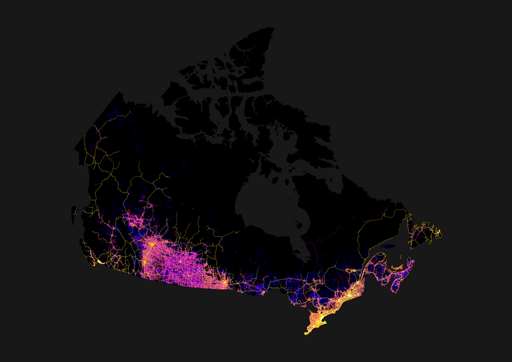Roads in Canada (lifted from imgur)
-
I don’t read this as Vancouver being isolated, I just read this as the prairies being victims/perpetrators of car dependent sprawl.
With a shit ton of complex geography, of course traffic is going to concentrate on a few main highways/roads
All of the agriculture and oil means there’s a road essentially on the whole survey grid too so that fills out a bunch of the map.
-
All of the agriculture and oil means there’s a road essentially on the whole survey grid too so that fills out a bunch of the map.
Totally. A bunch of roads all covering the farms. While in BC you won’t see “boat roads” for its huge water logistics.
-
Google reverse image search shows this as the original source: https://imgur.com/map-roads-of-canada-w7lDes8

Saskatchewan, why are even your roads weird?
-
Google reverse image search shows this as the original source: https://imgur.com/map-roads-of-canada-w7lDes8

I guess all the large areas shaded blue where I’m pretty sure there aren’t many roads (e.g. northern Ontario) are recent logging activity that still looks like roads to whatever software did the satellite image analysis.
-
Its because farther north than that is barely inhabited. North of roughly the orillia line, geography and community size changes dramatically compared to what is south of orillia. Its a good seperatation for political purposes as the needs and cultures in these smaller communities are different from the southern communities.
Northern Ontario starts at the French River, Orillia is just where the shield starts when driving from Toronto. Its an important geographic change but Kingston is practically in the shield too and I would hardly call that Northern Ontario
-
Some of it’s actually rail and not roads—I’m pretty sure that one line running up to the bottom of James Bay is actually the Polar Bear Express’ tracks for at least part of its length. Some may also be clearance for seasonal (ice) roads, or high-tension power lines. And yeah, some of it’s probably logging.
-
I don’t read this as Vancouver being isolated, I just read this as the prairies being victims/perpetrators of car dependent sprawl.
With a shit ton of complex geography, of course traffic is going to concentrate on a few main highways/roads
Eh. I read it as BC not getting much funding for infrastructure from the feds, coupled with copious issues with development and treaties. BC’s population is overly concentrated in the GVRD, with almost half the provinces people living there. Part of the reason being the lack of infrastructure / job opportunities in other regions.
-
Google reverse image search shows this as the original source: https://imgur.com/map-roads-of-canada-w7lDes8

I think this map + population density would make it very easy to spot where you can find oil in the world.
Low density + high amount of roads = oil
-
Eh. I read it as BC not getting much funding for infrastructure from the feds, coupled with copious issues with development and treaties. BC’s population is overly concentrated in the GVRD, with almost half the provinces people living there. Part of the reason being the lack of infrastructure / job opportunities in other regions.
It’s taken two decades just to get a highway expansion in Vancouver that serves millions of people.
There’s a bridge over a canal on one of the only ways to Vancouver from the rest of Canada and it’s pretty much falling apart, it’s embarrassing. It’s practically a farm bridge.
Tourists and visitors from out of province all have to cross that thing and it must be a hell of an introduction to Vancouver. It’s not even regular width for a two lane road, constant crashes in it. Good luck if two semi trucks need to cross side by side.
-
Northern Ontario starts at the French River, Orillia is just where the shield starts when driving from Toronto. Its an important geographic change but Kingston is practically in the shield too and I would hardly call that Northern Ontario
The actual border, per government definition, is the southern edge of the Parry Sound district. Which is north of Orillia.
-
The actual border, per government definition, is the southern edge of the Parry Sound district. Which is north of Orillia.
While technically true, that delineation has proven to be a political one. The previous liberal government redefined that district as southern Ontario, a move which was eventually reversed by the current PCs in part to afford the benefits of being a part of “Northern Ontario” to a PC stronghold that has been strongly contested by the greens in the past few elections. IMO theres more to it than just how the government defines it.
-
Saskatchewan, why are even your roads weird?
Which part? The southern prairie has ‘grid’ roads (magenta; literally roads in a grid, every mile E/W, every two N/S), with highways connecting the many towns and cities, settled because of agriculture. Then the northern shield (forest) has roads where they fit best to mainly indigenous communities.
-
While technically true, that delineation has proven to be a political one. The previous liberal government redefined that district as southern Ontario, a move which was eventually reversed by the current PCs in part to afford the benefits of being a part of “Northern Ontario” to a PC stronghold that has been strongly contested by the greens in the past few elections. IMO theres more to it than just how the government defines it.
On the one hand, the government (specifically the MTO, the only ministry that cared at the time) has been using the “southern border of Parry Sound district” definition for at least 35 years. It was on the forms when I applied for my first driver’s license, if I recall correctly.
On the other hand, I don’t claim that “Parry Sound district” necessarily covers the same geographical location now that it did back then.
On the third hand, if I were drawing an “I think this is northern Ontario” line, it would be at about the latitude of North Bay, but that’s just my opinion and has no authority. At least the government definition is official.
On the fourth hand, I think I’ve visited the actual town of Parry Sound for all of one hour thirty-odd years ago, so I can’t speak to its demographics or culture. We’ve almost never had any reason to detour that far from the straight shot down to Toronto along Hwy. 11.
-
I think this map + population density would make it very easy to spot where you can find oil in the world.
Low density + high amount of roads = oil
That correlates much more closely with agriculture than oil. Compare this map with one for arable land. Lots of the AB, SK, MB area covered in roads are also covered in farms, while large parts of that area does not have significant oil industry.
-
That correlates much more closely with agriculture than oil. Compare this map with one for arable land. Lots of the AB, SK, MB area covered in roads are also covered in farms, while large parts of that area does not have significant oil industry.
But wouldn’t farmed land increase if there is an abundance of oil? Needed for farming equipments.
I guess my point is. If there is an over abundance of oil it also facilitates agriculture because farming equiments is cheaper to power?
I don’t know if it translates to other places in the world because well…deserts and oceans but it would be interesting to find out.
-
I don’t read this as Vancouver being isolated, I just read this as the prairies being victims/perpetrators of car dependent sprawl.
With a shit ton of complex geography, of course traffic is going to concentrate on a few main highways/roads
The issue is mountains
-
But wouldn’t farmed land increase if there is an abundance of oil? Needed for farming equipments.
I guess my point is. If there is an over abundance of oil it also facilitates agriculture because farming equiments is cheaper to power?
I don’t know if it translates to other places in the world because well…deserts and oceans but it would be interesting to find out.
But wouldn’t farmed land increase if there is an abundance of oil? Needed for farming equipments.
Actually, most of the ground would have originally been broken using literal horsepower, which runs on hay rather than oil. Tractors didn’t become the norm until after WWI (maybe not even until after WWII, I’m not an expert on agricultural history, but I do know that the reason you used to see wooden grain elevators every few kilometers along prairie railways was to accommodate farmers who were still hauling stuff in horse-drawn wagons). By the time the oil was being commercially exploited, most of the useful land was already under the plow.
-
But wouldn’t farmed land increase if there is an abundance of oil? Needed for farming equipments.
Actually, most of the ground would have originally been broken using literal horsepower, which runs on hay rather than oil. Tractors didn’t become the norm until after WWI (maybe not even until after WWII, I’m not an expert on agricultural history, but I do know that the reason you used to see wooden grain elevators every few kilometers along prairie railways was to accommodate farmers who were still hauling stuff in horse-drawn wagons). By the time the oil was being commercially exploited, most of the useful land was already under the plow.
Interesting! Thank you for taking the time to explain
-
I think this map + population density would make it very easy to spot where you can find oil in the world.
Low density + high amount of roads = oil
Or logging, or farming. There’s a bunch of reasons to have low population density road networks.
-
Its because farther north than that is barely inhabited. North of roughly the orillia line, geography and community size changes dramatically compared to what is south of orillia. Its a good seperatation for political purposes as the needs and cultures in these smaller communities are different from the southern communities.
The North west is basically on fire year around now.
